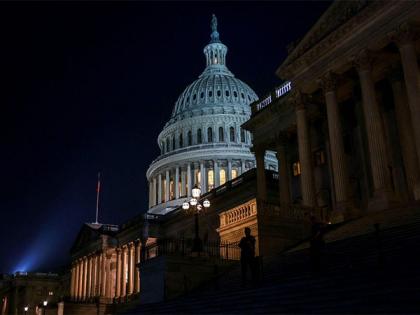US: Senate releases details of USD 118 bn aid proposal for Israel, Ukraine, Southern US border
By ANI | Published: February 5, 2024 07:07 AM2024-02-05T07:07:47+5:302024-02-05T07:10:05+5:30
Washington, DC [US], February 5 : The US Senate has released the details of a bipartisan USD 118.2 billion ...

US: Senate releases details of USD 118 bn aid proposal for Israel, Ukraine, Southern US border
Washington, DC [US], February 5 : The US Senate has released the details of a bipartisan USD 118.2 billion aid package proposal for Ukraine, Israel, and the southern US border, as it was made public by senators on Sunday (local time), following months of arduous, behind-closed-door discussions, as reported by The New York Times.
After nearly three months of daily negotiations between senators and Biden administration officials, the agreement was finally released.
This marked an unlikely breakthrough on a policy issue that has plagued presidents of both parties and thwarted attempts at compromise on Capitol Hill for decades. Late last month, President Biden pleaded with Congress to approve it, vowing to swiftly close the border once it was signed into law.
The majority leader and Democrat from New York, Senator Chuck Schumer, has stated that he intends to have a preliminary vote on the border and Ukraine package as soon as Wednesday, which will be crucial for determining its viability, reported The New York Times.
"I know the overwhelming majority of senators want to get this done, and it will take bipartisan cooperation to move quickly," Schumer said in a statement on Sunday.
The cost of the new plan, including the border restrictions, is anticipated to be USD118.3 billion, which is almost USD13 billion more than what Biden originally requested.
USD60.1 billion will support Ukraine in its ongoing conflict with Russia; USD14.1 billion will help Israel with security; USD10 billion will provide humanitarian relief to residents in crisis areas, such as Gaza, the West Bank, and Ukraine; and USD20.2 billion will be used to strengthen border security, The New York Times report said.
However, the former US President, Donald Trump has denounced the plan completely.
Proclaiming to "fight it all the way" and denouncing it as a "horrible, open-borders betrayal of America" at a Nevada campaign event last month, he pushed Republicans to veto the bill and "put the blame on me."
Notably, some of the most significant border security restrictions Congress has considered in years are included in the plan, such as making it harder to claim asylum, and essentially closing the border to new arrivals if more than 8,500 migrants attempt to cross in a single day, or more than 5,000 per day on average, over the course of a week. Before those procedures could be resumed, encounters would need to drop to 75 per cent of those levels for a week, the report said.
However, it does not meet a number of Republican requests, such as restricting parole and similar programs that let immigrants live and work lawfully in the US without a visa while they sometimes wait for an immigration court hearing.
According to the New York Times report, Republicans on the right have jumped at the chance to take advantage of the public's discontent with Biden's management of the border, and many have stated that they should not back any immigration legislation that would give the president or Democrats credit for solving the problem.
The law would establish a new voluntary repatriation program that would allow the government to transport migrants back home on commercial airlines, but it would also raise the bar for those who claim to have a "credible fear" of persecution if they return to their home countries.
However, it would also mandate that immigrants who can demonstrate a genuine fear be allowed to remain and work in the nation, and it would give immigration officials the authority to immediately grant asylum status to immigrants who make very strong arguments. The measure also establishes a review board to consider appeals of the rulings and render final verdicts on asylum claims within six months.
The bill also includes a version of the Afghan Adjustment Act, which creates a pathway to citizenship for Afghans who fled to the United States after the Taliban takeover.
It also includes a provision that would give every unaccompanied minor who is 13 years of age or younger a government-funded attorney, and it would give any immigrant placed in accelerated removal proceedings 72 hours to locate legal representation to contest deportation.
The bill would create 50,000 new green-card-eligible visas per year, for five years, 32,000 of which would be for families and 18,000 of which would be employment-based visas, the New York Times reported.
Furthermore, it establishes a new temporary visa category to allow noncitizens to visit the US-based family and guarantees that the offspring of H-1B visa holders maintain their eligibility for a green card upon reaching adulthood.
Disclaimer: This post has been auto-published from an agency feed without any modifications to the text and has not been reviewed by an editor
Open in app